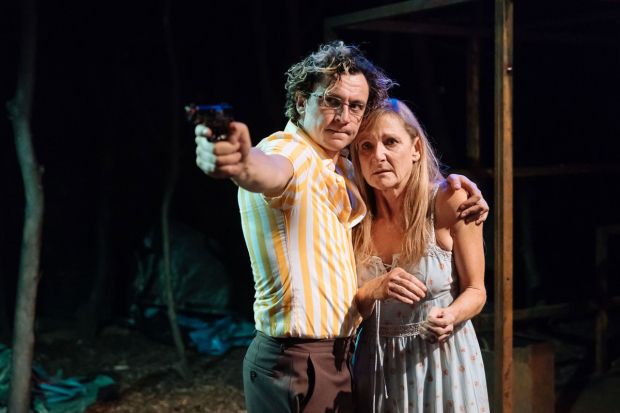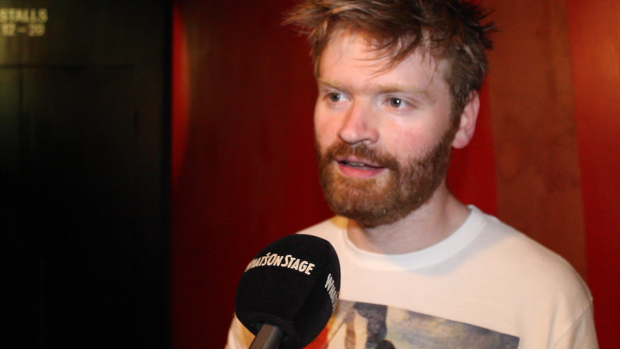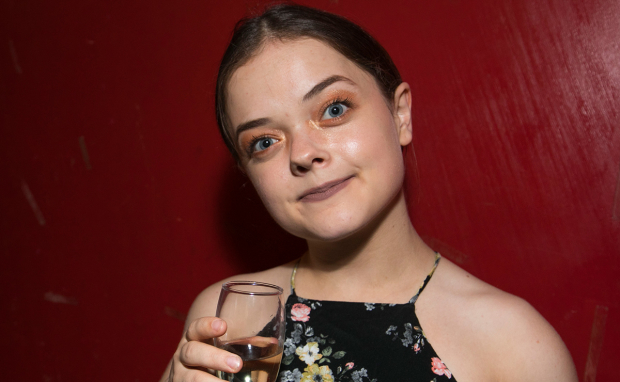Review: The Woods (Royal Court)

© Manuel Harlan
In a rusted, run-down cabin in the thick of a wood, a bedraggled woman confronts a mute young man curled up on the floor. He lies, doubled over, in the foetal position; possibly wounded, but still a potential threat. She stands back, terrified, and sizes him up between flashes of light. Winds howl around them. Wood splinters, trees crack. It's all very Cormac McCarthy: two strangers stranded out in the wilds of some precarious state.
Another flash of light reveals a whole other world – a contemporary kitchen cast in crisp white hangs suspended overhead. It's empty; a few tea towels, some mess, and a baby monitor bleating away, its little red lights pulsing like an alarm. A blackout later, we're back to the woods.
Robert Alan Evans' latest play gives its game away from the off. It doesn't take a genius to equate the two spaces: The Woods frames the first stages of motherhood as a wilderness state. As Lesley Sharp's Woman protects and tends to Finn Bennett's vulnerable foundling Boy – pulling a tarpaulin over the open door, coaxing a fire to keep them both warm – you clock the domestic equivalent straight away. She's a sleep-deprived mother nursing her newborn as if her life and his depended on it. The metaphor's apt. It does.
Rather than build on that, Evans merely lays a breadcrumb trail of clues eliding the two. Sharp digs up a teddy bear nightlight nearby, discarding a sodden cuddly toy, but items that should seem puzzingly incongruous merely confirm a suspicion the kitchen's already sown. When Sharp spoons soup into the young man's mouth, we don't see bizarre maternal echoes in a feral, fallen state, we see through the staged situation to the one it represents. Tom Mothersdale's wiley Wolf, who pursues the pair in a Kill Bill-style canary tracksuit, stands in for a paternal presence that threatens to tear mother from child.
You don't watch The Woods so much as decode it, and Evans undermines its enigma with too early a reveal. It's like filling in a crossword after being given the answer. Once we know we're watching a metaphor unfold – or an expressionistic version of an actual experience – the drama's reality is completely punctured. Its surrealism is squandered and its stakes deflate.
If anything, those clues make The Woods seem blurrier as the precise actuality comes into focus. Sharp's accent bleeds from Deep South to flat British and the gothic visage gives way as playgrounds and doctors appear like clearings in the woods. The specifics of post-partum depression start to show, with a wolf at every turn waiting to take one's child away.
With a few minor tweaks to keep its hand better concealed, The Woods would spring rather well and the notion of motherhood as a dystopian fairytale is sharp and unsettling. Were it not so scuppered, Lucy Morrison's febrile production would be fraughtly atmospheric and Sharp gives a frantic, agonised performance alongside Mothersole's slippery mix of comedy and creepiness. Anthony Arblaster casts eerie shadows across Naomi Dawson's woodland set, which achieves a flash of real danger as it bursts into flames that seem to lick at the Royal Court roof. The pity is that the play's already put itself out.















